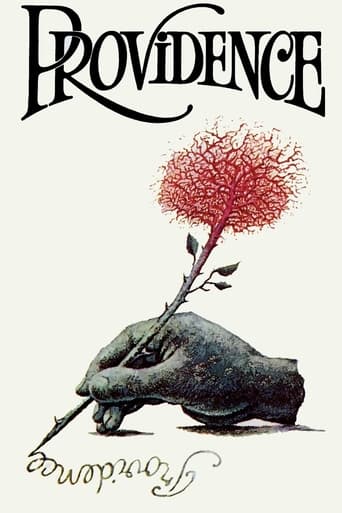moonmobile
This is my favourite film of all time. I first saw it many years ago, and it still remains my favourite. A masterpiece of subtle humour, irony, surrealism and commentary on what is real and what is fiction with a fantastic score and wonderful imagery. It also features some of my favourite actors - Dirk Bogarde, David Warner.Like another reviewer here I also frequently check to see if it has been released on DVD and am disappointed and puzzled by its continued non release. It is not as though it figures an obscure director and actors and it is Resnais' only film in English!I would also like to agree with other reviewers who says that it manages to capture the interior process of how a writer or creative artist works. There are very nice touches. As the writer (John Gielgud)gets progressively more sozzled on white wine, we see the characters he is imagining all standing around in the most improbable of settings with glasses of white wine in their hands.
flasuss
In Providence, his only film in English Language, Resnais again approaches the most recurrent subject in his career: the memory. Here, he explores how one's feelings can affect it: the life of the writer reflects directly on his view of his son and the wife of this one, and their respective (supposed) lovers, which actually are a representation of the writer's alienation, guilt and self-depreciation. It shows how memory can be more painful than any pain of the flesh, and even worse than reality itself. Like everything i've seen from Resnais so far (Night and Fog, Hiroshima Mon Amour, Mon Oncle D'Amérique and one of my favorite films, Last Year in Marienbad), this one is a very deep and original masterpiece.
Howard Schumann
How often do we awake from our dreams in a sweat, not knowing what is real and what is illusion? Especially if we are feverish, our dreams can turn close friends or family members into ogres and hateful creatures (or possibly werewolves) who are bent on our destruction. Such is the case with novelist Clive Langham (John Gielgud), a dying 78 year-old writer who is working on his final novel in the playfully bizarre 1977 English language film, Providence, by Alain Resnais (Hiroshima Mon Amour, Last Year at Marienbad, Muriel). The film depicts how physical and mental anguish can distort our view of reality. A poetic screenplay by playwright David Mercer and powerful performances by John Gielgud, Ellen Burstyn, Dirk Bogarde, Elaine Strich, and David Warner provide strong support.Clive does not go gentle into that good night. During one horrific night, all the pain of his life and disturbing family relationships boil to the surface. In the novel being played out in the author's mind, his family members, sons Claude (Dirk Bogarde) and Kevin (David Warner), and Claude's wife Sonia (Ellen Burstyn), mysteriously become the main protagonists, assuming roles as prosecutors and defendants, feuding spouses, and extra-marital lovers. As Clive goes deeper into the maelstrom, images become more and more hallucinatory. The denouement is witty, baffling, irritating, and then finally transcendent. To say that the ending is a surprise is a major understatement.Providence may exasperate you but, if you have patience, it can be a richly rewarding experience. As with all thought provoking and multi-layered films, multiple viewing may be required for full appreciation. Providence was voted the greatest film of the '70s by an international jury of critics and, at Telluride, Norman Mailer called it "the greatest film ever made on the creative process".
davidf33
A double header of complex imagination (first part) and painful recrimination (second part) in this film of deep feeling and hurt seen through the eyes of the dying author (John Gielgud). David Mercer's script includes all his life long angst of the relationship of father and son, although now in his final years fought out with more complex and participating female characters in the ghost of his dead wife, who doubles as his son's mistress (Elaine Stritch) and daughter-in-law (Ellen Burstyn).The acting is pure poetry with John Geilgud at his refined best as the drunken and dying author in part celebrating his life of drunken womanising and in part regretting the pain that he has caused, in particular to his family. Dirk Borgarde performing the impossible task of being two imaginary characters and one real one with seemless effort. As the son of the dying author he carries all the pain and hatreds of the dying father both in the old man's fantasy and in his real life of inherited disillusionment. His relationship with his wife and mistress (in practice his mother! complex eh!) changes from the deeply loving to the perceive accusatory of the old man's increasingly drunken imagination.Ellen Burstyn gives one of her finest film performances as the long suffering wife ,but in the end all the plaudits go to the writer. The style may be only that of the one-liner but each of them hits as an aphorism from the greatest of philosophical minds. The revolving characters of the final part of the authors dreaming make a bewildering tapestry of the imagination.A fabulous movie, but one that will take many viewings to actually comprehend the complexities of it. Set that video!!



